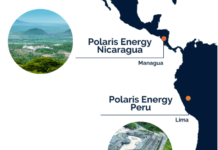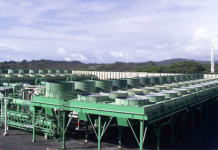Tom Konrad CFA
 |
| Geothermal Plant at The Geysers. Photo Source: Calpine (CPN) |
After a couple years of chilly investor sentiment, geothermal stocks are starting to warm up. The sector has been so beaten down that the small exploration and production players seem to have lost what little following they had, and so recent good news has gone mostly unnoticed.
Last week, industry leader Ormat Technologies Inc. (NYSE:ORA) set the stage by beating analyst expectations for both earnings and revenue per share in the third quarter, and announcing a deal to buy a project in Honduras. This led to an upgrade by Barclays.
As the only geothermal stock with the size and liquidity needed by large US investors, Ormat has long been too expensive (forward P/E of 23, even after a decline from over $30 in early to less than $17 today) for a relatively low margin utility business, so I prefer the much cheaper small geothermal developers, US Geothermal (NYSE:HTM, TSX:GTH), Ram Power (TSX:RPG, OTC:RAMPF), and Alterra Power (TSX:AXY, OTC:MGMXF.)
It’s hard to generalize from one geothermal company to another. Each geothermal project is unique, not only because of the local electricity markets and legal structures, but also because of the idiosyncrasies of each project’s geology and chemistry. Nevertheless, the smaller developers seem to be following Ormat’s lead.
On Thursday, US Geothermal (NYSE:HTM, TSX:GTH) received the $10.7 million cash grant for its San Emidio project, allowing the company to pay down a $7.5 million bridge loan. A year ago, I would not have considered this significant news, since I assumed the US Treasury would pay all such grants in full. That was before the Treasury cut the award for Western Wind Energy‘s (OTC:WNDEF, TSX-V:WND) grant by $12 million (3% of the request) after delaying it for almost two months. After that experience, a cash grant delivered seems a lot more significant than it once did. About $1 million of the grant application is still under review by the Treasury. This portion of the grant is related to some exploratory wells. Management is uncertain if this portion of the grant will be accepted, but it does not seem to be something that they are counting on.
UPDATE: Since this article was first published on November 16th, US Geothermal announced that it had achieved full commercial operations at its Neal Hot Springs facility in Oregon, and that the plant was operating above expectations. The stock is up 31% at $0.42 since then.
US Geothermal also reported third quarter earnings on Thursday, and the message was one of steady progress. Last year, Nevada Geothermal Power (TSX-V:NGP, OTC:NGLPF) and Ram Power were both tripped up by unpleasant surprises at their biggest projects. US Geothermal, in contrast, has been executing smoothly, and now has two operating projects. This will make the company less vulnerable to the vagaries of geothermal development at future projects. Part of that seems to be US Geothermal’s project selection. San Emidio, for instance, was an existing project with a known reservoir, which they upgraded by drilling some new wells and replacing an aging power plant. Because it was an operating project, US Geothermal knows a lot more about the idiosyncrasies of the reservoir than they would if it had been a greenfield project, and it was just those sorts of idiosyncrasies at Nevada Geothermal’s Blue Mountain project which ended in the company losing all its equity in the project because there is not enough revenue to repay the loan.
Ram Power (TSX:RPG, OTC:RAMPF) has also been making progress. Last year, problems developing their Jan Jacinto project caused large cost overruns. But the project now seems to be back on track with a new contractor. The company was able to negotiate a 17% increase in the power sales agreement which will make up for some of the extra costs, amounting to an annual $10 million in additional revenues per year when the project is complete. Despite this, the stock is being held back because steam production at San Jacinto is less than expected, a problem which they hope to remediated using the drilling reserves included in the original project financing. While there is always a significant risk that such remediation attempts will not succeed (as happened at Nevada Geothermal), the risk seems to be adequately compensated is a stock trading at less than a quarter of its book value.
Alterra Power (TSX:AXY, OTC:MGMXF) is more diversified, and hence safer than Ram and US Geothermal, with six operating geothermal, wind and run-of-river hydro power plants. Alterra currently hovers near profitability, with quarterly results fluctuating due to the seasonal production of its wind and hydro projects. Alterra also has a strong balance sheet (unlike Ram) allowing it to fund development and acquisition of additional projects (like a solar project acquired from First Solar (NASD:FSLR)) without returning to the equity markets.
Alterra recently signed an agreement with the Philippines based Energy Development Corporation (EDC) to fund the development six of Alterra’s geothermal projects in Chile and Peru, subject to EDC being satisfied with the results of due diligence field work on the projects. The stock did not see much of a boost from the announcement, most likely because EDC has not yet committed to the projects. Yet given Alterra’s current value pricing this seems as good a time as any to buy on the expectation that EDC will chose to go ahead with development at at least one of the projects.
Geothermal developer stocks have remained at beaten-down levels for over a year now, despite the companies making significant progress on their projects. While geothermal development is a much riskier business than more predictable development of other types of renewables, all of these developers are trading at a fraction of book value, which more than compensates for the risks involved, especially when held as part of a diversified portfolio.
A dip in a hot spring might be just the thing to the chill gripping the worlds stock markets in late 2012.
Disclosure: Long HTM, RPG, AXY, WND
This article was first published on the author’s Forbes.com blog, Green Stocks on November 16th
DISCLAIMER: Past performance is not a guarantee or a reliable indicator of future results. This article contains the current opinions of the author and such opinions are subject to change without notice. This article has been distributed for informational purposes only. Forecasts, estimates, and certain information contained herein should not be considered as investment advice or a recommendation of any particular security, strategy or investment product. Information contained herein has been obtained from sources believed to be reliable, but not guaranteed.







